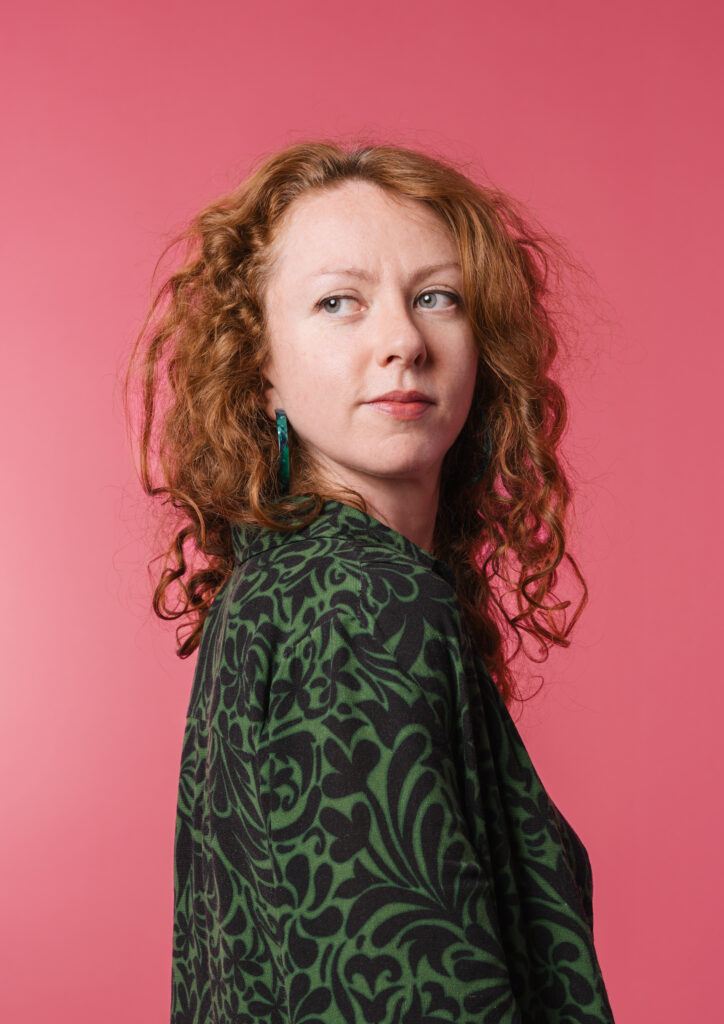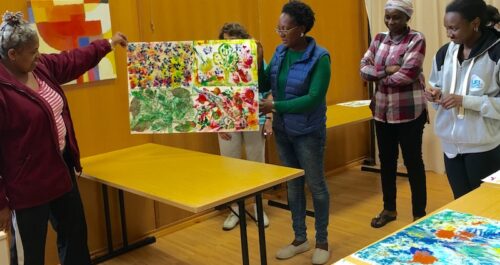Zoe Hardie
INT: Interviewer
ZH: Zoe Hardie
INT: Can you explain who you are?
ZH: I’m Zoe and I am a trainee psychotherapist and I worked at Rosetta for 3 years.
INT: Can you tell us a bit more about your connection to Rosetta?
ZH: So I first learned about Rosetta in 2019. I was working at the time in well in some international
fundraising for the creative sector at the British Council and I was really loving the job there, but I
knew that I had a real yearning for working closely with the community, em, so I was looking for jobs
and I found a job come up at Rosetta Arts as Deputy CEO and Marketing Manager. I looked at the
Rosetta website and just thought gosh, there is so much going on here, its courses, projects, working
with all different kinds of people, all different kinds of art forms and I had never heard of it. So, you
know a little bit of research, and I thought, you know I’ve got to apply for the role and got the job in
2019.
INT: Did you have any connection with Newham at the time? Were you local?
ZH: I’ve got a long-standing connection with East London . So, I grew up, well I was born in Bow. I
grew up in Newham and my sister lives in Newham. I mean, I’ve been coming to Newham pretty
much my whole life. I remember I have some childhood memories of going to the Old Stratford
Shopping Centre with my mum as kids, like really quite routine going to Percy Ingles. I was always
really excited about going to Newham and going to Percy Ingles in Stratford, so I think East London
and you know, Newham and broader East London, I've got a big emotional connection to. Em and I still lived, myself, in Stoke Newington – twice, I’ve lived in Leyton, Bethnal Green, Bow. So, it was
really important to me to be part of something that serves the communities of east London. And it
was really delightful to get to know Newham better.
INT: Can you start to talk about some of the changes that you see in Rosetta now?
ZH: Yeah, so you know, I suppose there are the big changes I’ve seen a lot of changes in Newham, a
lot of changes in communities, a lot of change in the built environment, a lot of changes in how
things look and whose here, and what’s pressing the Olympic Park and what’s changed during my
lifetime. Also, when I came to Rosetta there we were started to see the establishment of these big
organisations that have moved , em that’s been consolidated in the last few years. I just cycled to get
here and I saw the building of the new V&A and I thought, gosh! That’s here then. Em, and I have
had a feeling like that every time I have gone to the Olympic Park and it’s very very exciting, but I
think it comes, you know, this comes with so much opportunity and it comes with a lot of challenges
as well. A lot of change a lot of questions around who this will benefit and how they will benefit?
Actually, to bring it back to Rosetta, I think one of the key roles of Rosetta is making sure that the
changes that are happening in Newham and wider East Lo0ndon are serving the communities that
have been here for a while and you know the new Communities too, but that they are serving the
communities that are here.
INT: Can you touch a bit on what you would like to see in the future?
ZH: Yeah I think what I would like to see is a continuation of Rosetta working I know it's a cliche, but
on the ground, grass roots with smaller with the smaller organisations you know the libraries
community centres, schools and finding a way for them to be able to be linked up with, yeah the big new players that are here. I think one of Rosetta’s, I mean, I think the big strength of Rosetta is that
it’s small enough to be very human, so I wanna see Rosetta continue to have that real kind of like
human impact and the you know, like a be able to be part of the community in a way that people
know about Rosetta and know that you like …I’m losing my thread…
INT: Just carry on
ZH: I think what I’d like to see in the future is for small grassroots organisations, like Rosetta, to be
able to work together with smaller services, whether they’re libraries whether they’re hospices, care
homes, schools to continue to be able to bring up and you know the joy of making and creating are
to the local communities. I remember, you know, when I was working here, I think I was struck by
there’s so much untapped talent and it’s difficult, I think if you’re a very big organisation, to really
make contact with potential – because you need to build trust and you need to be working very very
closely and on a human level with the communities that you are working with. So, I think what I
really liked it it’s kind of complicated because I’d love to see Rosetta really really grow, but I want it
to also not grow too much because I think, yeah it needs to have a sense of people knowing the
human beings that work for it, that are associated with it, volunteers the artists and I think that's
how you build trust with other organisations. So, I want it to be able to keep a lot of its character
and I wanted to be able to work closely with, yeah the other kinds of small organisations; the
services; council, but also really as it’s doing, link up with other big players that have entered East
London and particularly around the Olympic Park, but other places too, so I think probably what I’m
trying to say is as I think there’s something of its character that I really hope is maintained and I
expect to maintained. Its really, it’s done such a good job of being itself, being really authentic and
having a strong sense of itself. So, my wish is that that can continue and they can grow enough to
serve people, but without losing that.
ZH: So, I joined Rosetta in 2019 as a marketing manager and as a Deputy CEO and I’ve had a few
different roles in Rosetta which is quite typical of it as an organisation, which is the beauty of it as
you learn so many different things. I worked as a project Manager I covered Sanaz the Chief
Executive at the time on her maternity leave, so I was Acting CEO, eh, just in time as the pandemic
so everything had to go online. So, it was a very interesting experience for me and an unusual time
to cover that role when everyone was working from home, everything has to go online and we had
to rethink and re–programme Rosetta’s offering so that it could continue both as an organisation,
and so that we could continue to engage Newham’s Communities during the pandemic when there
was so much need for things to do and so much appetite for things to do of course because people
had become a lot harder to engage with in many ways. So, a lot of what I had to do was around
video conferencing, zoom workshops and digitising our offering.


